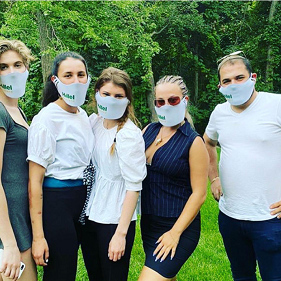“Radical pluralism” gives Hillel of Rockland its unique flair

Tucked into the rolling hills some 30 miles north of New York City lies Rockland Community College. Like many colleges and universities across the United States, the campus also includes a Hillel House.
At Hillel of Rockland, Hasidic and secular students shmooze, join group activities, hang out, and support each other. Under the direction of husband and wife duo Shevy and Rabbi Dov Oliver, Hillel of Rockland’s guiding principle is radical pluralism: the notion that religious, ethnic, and social groups can come together even though their backgrounds greatly differ.
When they moved back to Rockland 14 years ago, the pair started running the Hillel using a more typical approach, with most students hailing from Reform and Conservative Jewish backgrounds. As the years went by, more Orthodox students started attending the college, and were naturally drawn to Hillel. Rockland County is now home to the most concentrated Jewish population per capita of any county in the United States, with 31.4 % of its residents identifying as Jewish. Still, a divide rifts through the county, says Shevy.
At first, the couple encountered challenges. While some issues stemmed from pronounced student differences, Shevy and Dov also wondered how they could provide a meaningful Jewish learning experience to Orthodox students who arrived with 15-plus years of formal Jewish education under their belts.
“We were sort of thrown,” Shevy says. “And then what happened was, over time, I realized that this was an opportunity for us to endorse and model tolerance and pluralism in our community, which is so necessary and so needed.”
After leaving yeshiva at age 16, Mendy Green decided to apply for an early admission program at RCC. Soon after, Hillel of Rockland’s student vice president reached out and suggested he check out the organization.
“I was like, ‘I just got rid of all the rabbis in my life, I’m not looking to meet another one,’” Green said. “And she said, ‘no, it’s amazing, you have to check it out.’ So I decided to go check out the Hillel room at RCC, and it was amazing. I felt celebrated and loved the moment I stepped in there, and I ended up developing a friendship with Dov.”
Stepping into a lifestyle that feels almost foreign does not come without complexities . Green, who is now 24, remembers walking down the hallway and feeling scared because the Hillel experience was still new to him. But soon enough, he met people with different yet similar backgrounds and connected with everyone.
Hillel of Rockland alumna Alex Weber, 25, shared a similar sentiment. Weber comes from a Reform background and never had any Jewish friends in school while growing up. When she walked into the Hillel, she met several different kinds of Jews.
“It was the first time that I was in a room full of Jewish people who were also my classmates,” Weber says. “I’d never met any religious Jews before that either, so that was new to me and it was a great experience that led me to make a lot of friends.”
Part of Shevy and Dov’s work in paving the way for an inclusive environment at their Hillel has been recognizing that more and more of their students come from economically disadvantaged backgrounds. To help, Shevy and Dov try to connect them with resources in the Jewish community, as well as the broader community, says Dov.
The pair will also refer students to therapists and social workers because those needs are not always met in their home communities, he added.
“These kids need the full package in terms of being supported, financially, emotionally, socially,” Dov says. “We try to meet them wherever their needs are.”
During the COVID-19 pandemic, the Olivers and their students gave boxes of food to people quarantining, and planned socially distanced events like debates, outdoor movie nights, karaoke, inspirational lectures and hikes.
Weber, who still lives in the area, joined the hiking group. She says that Shevy and Dov make these activities accessible.
“It’s really nice, especially in this political climate and with the rise in antisemitism,” Weber says. “I feel like you can be friends with other Jewish people, and being connected to the community is really important.”